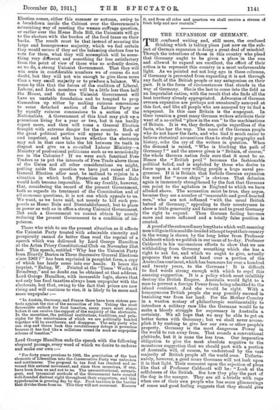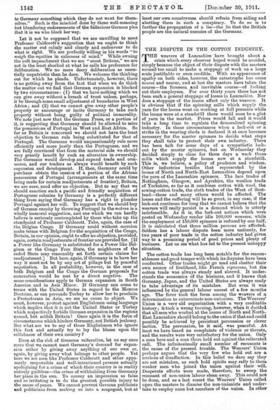1'.11.0 EXPANSION OF GERMANY.
1-11confused writing and, still more, the confused 3inking which is taking place just now on the sub- ject of German expansion is doing a great deal of mischief. Though the intentions of those in this country who plead that Germany ought to be given a place in the sun and allowed to expand are excellent, the effect of their action is to represent this country in a most unfavourable light. As we pointed out not long ago in these columns, if Germany is prevented from expanding it is not through any fault of the British people or any antagonism on their part. It is the force of circumstances that stands in the way of Germany. She is the last to come into the field as an Imperialist nation, with the result that she finds all the best territory already appropriated. Advocates of German oversee, expansion are perhaps not unnaturally annoyed at this fact, and like all people who are annoyed try to find a. scapegoat. In this case Britain is the scapegoat. In their vexation a great many German writers attribute their want of a so-called. " place in the sun " to the machinations of Britain. It is we, they declare, quite regardless of the facts, who bar the way. The mass of the German people who do not know the facts, and who find it much easier to believe rhetorical accusations than to study geography and history, echo the cry of the writers in question. When the demand is raised, " Who is blocking the path of Germany ? " and the answer given is " Britain, of course," the whole German nation feels sure that it must be so. Hence the " British peril " becomes the fashionable political belief, and is exploited by those who desire to force upon a not very willing people a huge naval pro- gramme. If it is Britain that forbids German expansion the need. for " more ships " is obvious. That delusion again is immensely strengthened. by the fact that Germans can point to the agitation in England. to which we have alluded. above. The accusation must be true, they argue, because they see a number of "reasonable and good-hearted. men," who are not inflamed "with the usual British hatred of Germany," appealing to their countrymen to show a little generosity and fairness and to grant Germany the right to expand. Thus German feeling becomes more and more inflamed and a. totally false position is created.
A proof of the extraordinary lengths to which well-meaning men will go in this muddle-headed attempt to put their country in the wrong is shown by the long letter from Professor Caldecott which we publish in our issue of to-day. Professor Caldecott in his unconscious efforts to show that we are withholding from Germany something which she has a right to ask for, and which we ought to give, actually proposes that we should hand over a portion of the Australian continent, which has been ours for over a hundred. and twenty years, to the Germans ! It is difficult to find words strong enough with which to repel this amazing suggestion. It is a policy which must infallibly destroy the British Empire, Australia would fight to a man to prevent a foreign Power from being admitted to the island continent. And she would be right. With a homogeneous British people she may possibly succeed in banishing war from her land. For the Mother Country in a wanton ecstasy of philanthropic sentimentality to introduce a military race like the Germans would be to make a bloody struggle for supremacy in Australia a certainty. We all hope that we may be able to get on better terms with Germany; but we shall never accom- plish it by rushing to give her our own or other people's property. Germany is the most dangerous Power in the world. to run away from. That sounds a conventional platitude, but it is none the less true. Our imperative obligation to give the most absolute negative to the monstrous suggestion that we should part with a portion of Australia will, of course, be understood by the vast majority of British people all the world over. Unfortu- nately, however, a good many Germans will not look upon it in that light. Their comment upon the rejection of pleas like that of Professor Caldecott will be : " Look at the selfishness of the British. See how they play the part of the dog in the manger. They are all a-bristle with rage when one of their own people who has some glimmerings of sense and good feeling suggests that they should give to Germany something which they do not want for them- selves." Such is the mischief done by these well-meaning but blundering endorsements of the fallacious German plea that it is we who block her way.
Let it not be supposed that we are unwilling to meet Professor Caldecott's suggestion that we ought to think the matter out calmly and clearly and endeavour to do what is right. We are perfectly willing in his words "to weigh the equities in calmness of mind." While owning the soft impeachment that we are " stout Britons," we are not in the least shocked at what he calls his preference for deliberation. We no more decry deliberation as essen- tially unpatriotic than he does. We welcome the thinking out for which he pleads. Unfortunately, however, there is no getting away from the fact that when we do think the matter out we find that German expansion is blocked by two circumstances : (1) that we have nothing which we can give away without a breach of trust unless, perhaps, it be through some small adjustment of boundaries in West Africa ; and (2) that we cannot give away other people's property or encourage or incite Germany to take such property without being guilty of political immorality. We note just now that the German Press, or a portion of it, is suggesting that Germany should be allowed to seize the possessions of Portugal in West and East Africa. So far as Britain is concerned we should not have the least objection to German rule being substituted for that of Portugal. The Germans would unquestionably rule more efficiently and more justly than the Portuguese, and we ire fully convinced that from the material side we should very greatly benefit by such an alteration in ownership. The Germans would develop and expand trade and com- merce, and our traders as always would benefit by such expansion and development. If, then, Germany could by purchase obtain the cession of a portion of the African possessions of Portugal (arrangements at the same time being made for certain readjustments of frontier), Britain, we are sure, need offer no objection. But to say that we should sanction such a pacific and friendly acquisition of Portuguese colonies by Germany is a perfectly different thing from saying that Germany has a right to plunder Portugal against her will. To suggest that we should buy off German enmity by throwing Portugal to the wolves is a wholly immoral suggestion, and one which we can hardly believe is seriously contemplated by those who take up the standpoint of Professor Caldecott. Take, again, the case of the Belgian Congo. If Germany could without coercion make terms with Belgium for the acquisition of the Congo, Britain, in our opinion, ought to offer no objection, provided, again, certain readjustments of frontier are provided for. [If a Power like Germany is substituted for a Power like Bel- gium or the Congo Free State, the neighbours of the ceded State may reasonably set forth certain claims for readjustment.] But here, again, if Germany is to have her way it must not be by any act of pillage but by peaceful negotiation. In all probability, however, in the case of both Belgium and the Congo the German proposals for annexation would be met by a direct negative. The same considerations apply to German expansion in South America and in Asia Minor. If Germany can come to terms with the United States in regard to the Monroe Doctrine, or can persuade Turkey to allow her to proclaim a Protectorate in Asia, we see no cause to object. We must, however, protest against Englishmen using language which implies that it is not the United States or Turkey which respectively forbids German expansion in the regions named, but selfish Britain ! Once again it is the force of circumstances which hinders Germany, not British jealousy. But what are we to say of those Englishmen who ignore this fact and actually try to lay the blame upon the selfishness of their own country ?
Even at the risk of tiresome reiteration, let us say once more that we cannot meet Germany's demand for expan- sion either by giving away anything of our own or, again, by giving away what belongs to other people. Yet here we see men like Professor Caldecott and other appa- rently responsible and well-intentioned persons actually apologizing for a crime of which their country is in reality entirely guiltless—the crime of withholding from Germany her place in the sun. To convey an impression so false and so irritating is to do the greatest possible injury to the cause of peace. We cannot prevent German publicists and politicians from making us into a scapegoat, but at least our own countrymen should refrain from aiding and abetting them in such a conspiracy. To do so is to further the propagation of a lie—the lie that the British people are the natural enemies of the Germans.







































 Previous page
Previous page